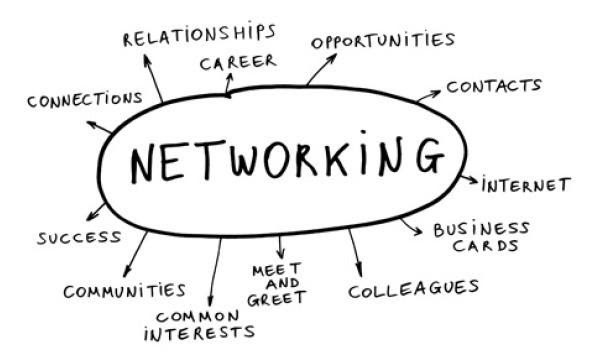
Kick start your career on March 14, 2020 at the I-Work! Career Conference!
I-Work! Career Conference offers students an opportunity to connect with working professionals from various disciplines such as Human Resources, Business Development, and Investment Managers, as well as hear from international student alumni share their experience on how they found work in Canada.
There’s a famous quote (from former Yahoo! executive Tim Sanders) that says: “your network is your net worth.” Having a strong network is extremely essential not only for students but for any individual trying to build a successful career. As a student starting her co-op career, I’ve always had this question in my mind: “How can I build a strong network?”

Events like job fairs are a great way to build a good network by having an in-person conversation with employers from different companies. When I first heard about job fairs, I jumped at the opportunity to attend them — but did not do any proper research before attending. After a couple of failed attempts at building a network and acing a job fair, I realized that simply walking into a job fair does you no good.
Acing a career fair is just like acing an exam: it requires you to be prepared. The U of A offers a variety of workshops aimed towards helping students ace a career fair, and I tried out the “How to WOW at a Career Fair” workshop offered by the Engineering Employment Centre.
[Editor’s note: Most faculties offer their own career resources, and the Career Centre offers workshops throughout the year for all students. International Student Services offers “I-Work” career workshops throughout the year.]
From the workshop I learned that, to get the most out of a job fair, you should prepare for these three stages:
1. Do your research

Researching the companies participating in the job fair and the positions they are offering is an excellent way for you to decide which companies you are interested in talking to. Such research also allows you to impress the employer with your knowledge about the company.
- PRO TIP: Employers usually give preference to well-prepared students, as it makes the students look serious about building a career.
2. Know what you’re going to talk about2
There are two key points in a conversation with an employer where you can stand-out: your introduction and the questions you ask the employer. It is a good strategy to prepare a short introduction (your name, program, and skills) and some good questions for the employer (focus on questions that help you learn more about the company and the skill sets they are looking for).
3. Decide your attire

From what I have experienced, employers tend to take students dressed in formal/business-casual attire more seriously than those dressed in casual clothes like hoodies and a pair of jeans. This is because formal attire makes you look more professional and prepared than others and it creates a good first impression for the employer.
4. Print your resume
Going to a job fair without a resume is like going on a vacation without a wallet! In most cases, companies ask students for a resume. If you go without one, you might lose out on a lot of good opportunities.
5. The magical handshake

Beginning a conversation with a good handshake and a smile is a must for every job fair. However, if you’re sick you should avoid a handshake and explain to the employer why you can’t offer one. Likewise, in some cases the employer may avoid a handshake because of their health or preferences. Don’t be intimated if that happens with you. (Make sure to wipe your hands before the handshake if your hands are wet or sweaty.)
6. Watch your body language
During a conversation with an employer be aware of your body language. Avoid covering yourself by crossing your arms or holding anything that covers you. Be sure to seem engaged in the conversation by listening carefully, avoiding looking at other people, refraining from yawning or biting your nails, and not focusing on the free swag!
7. Be confident

Practice the following to show the employer that you’re well prepared and confident about yourself:
- Maintain eye contact
- Talk politely
- Smile and give a good vibe
- Focus on the conversation and show that you’re interested
- Don’t force a conversation or boast about yourself
- Lastly, end the conversation with phrases such as “thank you,” ”nice to meet you,” and “have a good day.”
Your attempt at acing a job fair doesn’t end when you leave. One of the most important keys towards making strong connections is a follow-up. Decide on the people you feel you want to connect with, and those who are willing to connect with you as well. A follow up could be in the form of an email or via LinkedIn. It is considered good practice if you follow up after a day or two after the job fair. It is extremely important to include some relevant details in your follow-up such as:
- Your name
- How and where you met the employer
- Key points of your conversation
- An interest in having future conversations
When all your attempts are done, make sure to apply on the company website as well. This is because, in some cases, companies keep track of the number of applications and the candidates and it is important to apply on the company’s portal.
Once all this is done, relax and pat yourself on the back for all the hard work you’ve done. Sometimes, you might not find the network you were looking for, or sometimes you might feel that a particular employer is not interested in being a part of your network. All this is absolutely normal and is a part of your learning experience. For as long as you keep trying and working hard, you will succeed one day. Until then, good luck for all job fairs that you attend!

International students should review the guidelines about the amount and type of work permitted with their enrollment and study permit. International students can make an advising appointment via email with Wendy Yu, International Student Advisor — Career Development. All undergraduate and graduate students can access the resources offered by the Career Centre, including career coaching, advising appointments, and workshops.